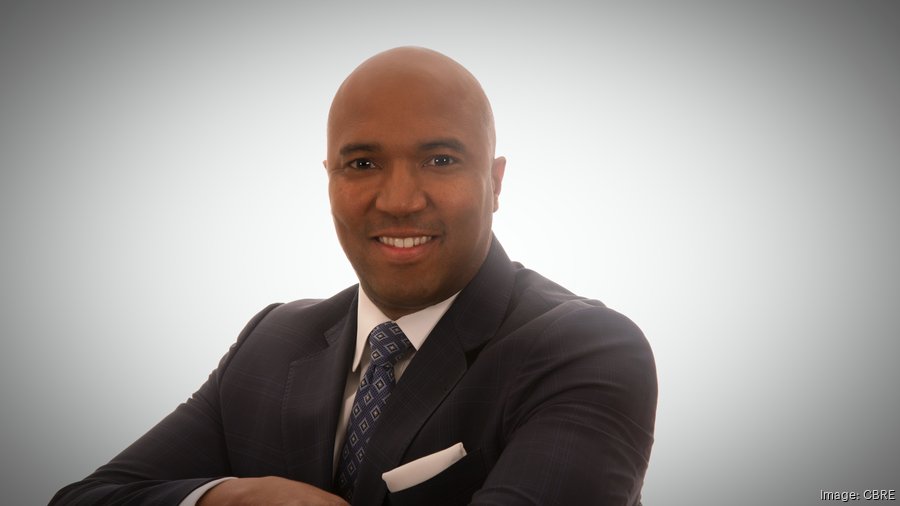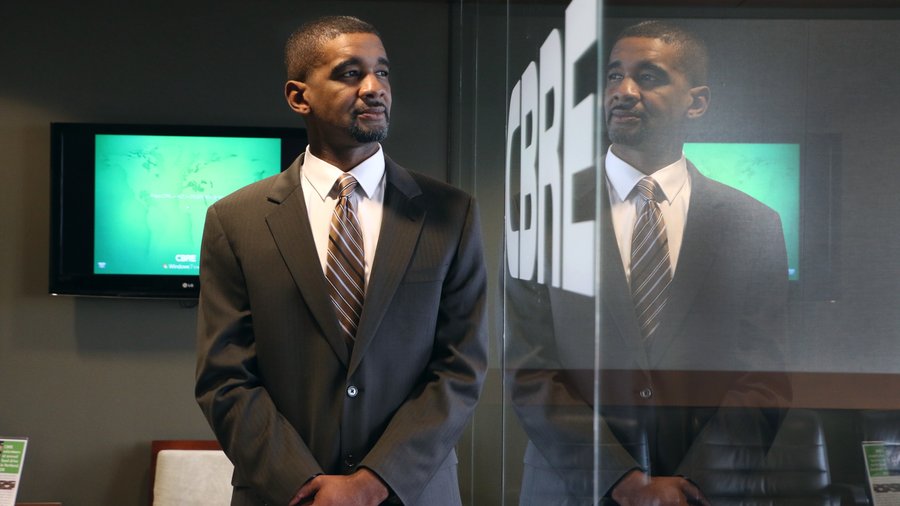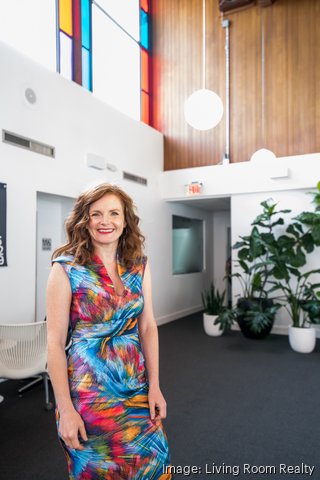Anyeley Hallová moved to Portland from Atlanta in 2007 and set out to land a job in real estate development. She had experience working as an urban designer and a stack of degrees to her name, including a master’s degree in city planning from the Massachusetts Institute of Technology.
What she didn’t have were any connections, which put her at a serious disadvantage in a city where job prospects frequently rest on who you know. She started cold calling companies and eventually secured a job at real estate firm Gerding Edlen after a higher up “gave me a chance,” she said.
Today, Hallová, who is Black, is a partner at development firm project^, where she works with Tom Cody, who hired her at Gerding Edlen. She's one of the few women of color to rise to a top leadership position at a real estate firm in Portland.
“We have the power in our industry to affect the environment, to affect people, to affect their welfare,” she said. “That’s what makes me excited about being in this. And I would love to see more people from diverse backgrounds that look like me, that come from all different walks of life, be able to influence the environment that we all live in.”
Roughly 83 percent of the more than 2.9 million people working in real estate jobs including leasing, sales and management last year were white, according to estimates from the U.S. Bureau of Labor Statistics. People of color made up a much smaller percentage: About 10 percent were Black or African American, for instance, while 5 percent were Asian.
While those numbers line up fairly closely with the U.S. population, of which 76 percent identified as white last year, the lack of diversity in real estate has the potential to exacerbate racial inequality. Many hands shape a city. But people in real estate hold a lot of sway over how communities evolve, with influence over who lives in what neighborhood and who works in what part of town. Developers and contractors build the roofs. Brokers pull together the deals that put people under them. Social networks underpin much of the work.
There are existing programs to create pathways into real estate for BIPOC, and companies, including CBRE, have intensified their own efforts in the wake of the killing of George Floyd. But change is slow and demands a considerable and sustained investment of time and resources to be effective.
Widening the gap
Real estate hiring tends to happen within close-knit groups. Fathers pass jobs to sons. Fraternity brothers or similar connections help people get an inside track to open positions.
Dr. Elizabeth Korver-Glenn, assistant professor of sociology at the University of New Mexico, says white people who work in residential real estate tend to socialize with other white people, including customers. But they don’t just connect customers with homes. They also connect them with friends in mortgage lending, home inspection and development.
In her book due out next year, “Race Brokers: Housing Markets and Segregation in 21st Century Urban America,” Korver-Glenn tells the story of a real estate agent who once took his wealthy Black clients to view a house in Texas. In an unusual move, the white home sellers didn’t leave during the tour. “(The sellers) shadowed the Black customers for the entire time,” Korver-Glenn told the Business Journal.
Workers on the commercial side benefit from social advantages, too. “Commercial real estate is especially prone to existing social networks not only in sales and brokerage, but in the attraction of professionals,” urban researcher Michael Rodriguez wrote in June for Greater Greater Washington, a nonprofit that pushes for diversity and inclusion in the Washington, D.C. area. Peers who are white are frequently the first to learn of opportunities, he wrote.
Rodriguez called on real estate owners and prospective tenants to think seriously about their relationships with brokerage firms. They should “demand diversity.”
“If you’ve favored the same broker for years, we all get it, your kids play baseball together and things like that,” he wrote. “What you can do is also ask that the associates on a lease or deal have more diverse faces.”
For those without a personal or professional connection, a lack of traditional pathways into the field poses another challenge, though Hallová said more academic programs are emerging. Portland State University's Center for Real Estate, one of the only industry-focused academic centers in the region, offers certificates and a business minor in property management, and a Master of Real Estate Development.
Yet schooling only takes you so far.
“It still takes that personal connection, and it still takes that person giving you a chance, because most of development understanding comes through experience,” Hallová said.
Building the network
Project REAP, a New York-based nonprofit, has pushed for more than two decades to get people of color into real estate.
Before Covid-19, the Real Estate Associate Program worked by putting students through a 10-week academy, with three-hour evening classes held twice a week. During the program, participants learned about at least three property types: retail, office and multifamily real estate. They gained familiarity with financial analysis and property management.
REAP has outposts from Washington, D.C., to Los Angeles. Tuition recently stood at $1,000, and most of the nonprofit’s money comes from outside contributors. In 2018, it obtained more than $320,000 in contributions, and generated more than $94,000 in program service revenue, federal filings show. Corporate sponsors include Walmart, J.P. Morgan Chase, Microsoft, and McDonald’s, along with industry associations such as the Urban Land Institute, the International Council of Shopping Centers and the National Multifamily Housing Council.
In light of the pandemic, REAP said it is partnering with the Urban Land Institute to offer an online, eight-week fall academy for $750, during which people who are chosen are expected to work for about four to six hours per week on curriculum. Portlanders can apply, a REAP spokeswoman said.
With a 22-year program history, many REAP graduates are now in a position to hire others, REAP Chairman G. Lamont Blackstone said. “By virtue of their own positive experience with REAP, they will look to REAP as a source of talent.”
It’s happened locally. Natalie Hooper, a 2011 graduate, has worked at Nike since 2015. She became a real estate director for the Washington County-headquartered athletic wear company in 2018, according to a REAP spokeswoman. In March, Hooper hired Jacquelyn Dillon, who graduated from the 2018 class in Washington, D.C., as a lease acquisition manager for Nike.
On July 14, REAP issued a “call to action” telling executives they should invest in those they hire by covering membership fees for trade groups. Underscoring the importance of relationships in real estate, the organization called on executives to introduce new hires from diverse backgrounds to their professional networks as they’re brought aboard.
“It’s not enough just to make the hiring decision,” said Blackstone. “How are you going to go about cultivating that talent, keeping in mind that you're talking about a talent pool which by and large comes into the business without the competitive advantages that legacy candidates have had?”
Executives should have “double vision,” he said. They need to acknowledge that systemic racism in the U.S. is real, but also understand the business benefits of workplace diversity.
Putting diversity 'front and center'
Tim Dismond was working in his home study in the Dallas-Fort Worth area in June when his boss called him unexpectedly.
Bob Sulentic, CBRE’s president and chief executive, wanted to talk to Dismond about becoming the real estate firm’s first chief diversity officer. Dismond, who is Black, had been in charge of thousands of employees through CBRE’s global workplace solutions division. By the end of the conversation, Dismond had agreed to take the job. He says he was elated as he hung up the phone.
CBRE was Portland’s fifth largest commercial real estate firm in the metro area last year, ranked by total licensed brokers, according to Business Journal research. Across CBRE’s U.S. workforce, a majority — 67 percent — is “Caucasian” while 23.5 percent is “diverse,” the company’s latest corporate responsibility report shows. The rest were “unspecified.” Six members of CBRE’s 11-person board of directors are either women or people of color, according to company officials.
The real estate company announced Dismond’s promotion on June 24. Dismond reports to Sulentic and sits on the global executive committee. Diversity is on the agenda of every monthly global operations call.
“It now has become front and center,” Dismond said.

Prior to the announcement about Dismond’s promotion, CBRE this year hosted its first town hall centered on racial inequality. Dozens of “courageous conversations” have followed, Dismond said.
CBRE touts what it calls Employee Network Groups, including the African-American Network Group and Asia Pacific Network. They offer chances for networking and professional development, the company says. In 2019, more than 2,000 workers joined the networking groups, placing total membership at more than 11,000, according to the corporate responsibility report. A new group for people with disabilities and their allies was green lit earlier this year.
A CBRE diversity and inclusion council in 2019 approved initiatives aimed at making sure open positions at the director level and higher have diverse candidate slates and interview panels.
Talented people from diverse backgrounds don’t always have a way into real estate, Dismond said. He said the company has made progress and has recognized areas where it needs improve, including its recruitment practices.
“We’ve got some work to do,” he said.
Jason Green, who is African American, is managing director of CBRE’s Portland office.
Growing up in Southern California’s San Gabriel Valley, he watched stretches of farmland become the ground for single family homes and commercial developments. Green was a linebacker for UCLA in the 1990s but two ACL tears sidelined his hopes for a professional career. He spotted a research analyst internship with the real estate firm Sperry Van Ness in UCLA’s career center. That was 1995, and the experience kicked off his real estate career after graduation.

Green said he regularly meets with young people from diverse backgrounds who are interested in a career in real estate. He’s known Dismond for about eight years and is confident he will help move the needle on diversity.
“If (there’s) anything I know about Tim, he’s going to hold us accountable to it and hold himself accountable to the outcomes that are produced.”
Beyond a 'seat at the table'
Accountability is a must in order to move the needle on diversity and equity. Serilda Summers-McGee, founder and chief executive of human resources firm Workplace Change, says it’s important that HR professionals and other managers throughout an organization have measurable hiring and workforce goals.
DE&I professionals only hold so much power if they don’t have the team members and budgets to carry out their work. Otherwise they can be “toothless” roles, she said.
“It’s not enough to say that the historically invisible person in an organization should just be thankful and grateful that now they have a seat at the table, if they don’t have any authority to actually be able to move the dial on anything,” Summers-McGee said.
Diversity, equity and inclusion needs to be baked into aspects of the company beyond building a more ethnically diverse workforce, she said. It needs to be integrated into policies and operations down to whom the company works with in banking, development and catering.
Jenelle Isaacson, the owner of the Portland residential real estate firm Living Room Realty, has been intentional in diversifying leadership in her company and, by extension, the communities Living Room serves.
The former member of punk rock band Spread Eagle earned her license in 2002. After years in the business, Isaacson, who is white, started Living Room Realty during the Great Recession, in part because she didn’t see herself in other agents.
“My clients are a reflection of who I am,” she said. “When I started my business, it was young artists and musicians.”
Today she’s come to realize that if those in real estate sell to people within their own communities, “then I need to make sure my community is broader to bring those buyers and sellers in.”

Isaacson emphasizes racial and gender diversity within her firm’s ranks. In 2016, she implemented Topgrading, a hiring method that places systematic processes over who-you-know referrals. Today, women of color run every division of the company, which encompasses corporate, property management, facilities and membership services.
She said a key to retention is having company leaders reflect the staff’s diversity: When workers have managers they trust, they feel safe, heard and like they’re part of a community.
“Feeling seen and understood’s the big one,” Isaacson said.
Understand the history
On a recent road trip, project^'s Hallová finished the book “The Color of Law: A Forgotten History of How Our Government Segregated America,” by Richard Rothstein. The book examines how real estate and government officials contributed to racial segregation. Everyone in real estate should read it, she said. “Every fiber of our modern-day real estate industry is shaped by that history.”
In an email, Rothstein said “the residential racial segregation of every metropolitan area is the result of racially explicit federal, state, and local government policy, regulations and ordinances designed to ensure that African Americans and whites could not live near one another."
Those policies still influence the racial makeup of neighborhoods today, he said.
A more diverse real estate workforce can help address inequality rooted in decades of systemic racism. For Hallová, what's also needed is a deep examination of laws, regulations and industry tactics that have shaped what exists today.
“If we fully embrace that, we’ll all be compelled to do everything within our sphere of influence or power to change that,” she said. “It’s not just little things. It’s actually coming to grips with how our industry has contributed toward where we are today.”
